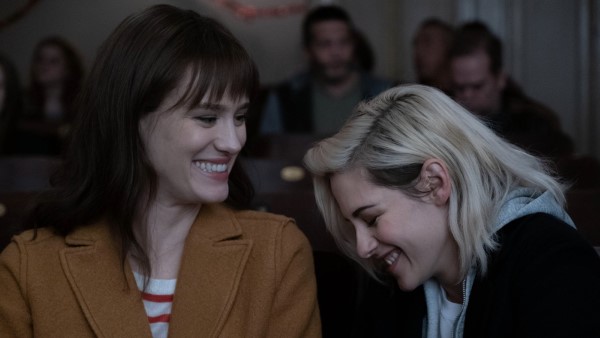
It’s that time of the year again for holiday movies, whether it’s Addams Family Values to bridge the gap between “spooky season” and Thanksgiving, or the John Candy twofer of Planes, Trains & Automobiles and Home Alone to get you through the last month or so of the year. We tend to stick to the lighter comedies at our house, avoiding the emotional powder keg of old family issues erupting to the surface under the pressure-cooker of an overcrowded home combined with too much—or too little—alcohol (think Home for the Holidays). The blandly titled Hulu exclusive from director Clea DuVall, Happiest Season, tries to thread the needle of these two holiday genres, while adding an underexplored perspective to the classic “bring your girlfriend home to meet the parents” format.
Kristen Stewart plays Abby, the girlfriend who has avoided Christmas ever since her parents passed roughly a decade ago. Mackenzie Davis is Harper, her girlfriend, who in a fit of joy asks Abby to come home with her for Christmas, only to later recall that her mayoral candidate father and her prim and perfect mother don’t yet know about her girlfriend Abby, or that she would even have a girlfriend and not a boyfriend.
This central conflict of Harper’s inability to be open or truthful with her parents is the driving force behind much of the comedy and all of the drama. Mary Steenburgen as Harper’s mom, Tipper (perfect name), is great as the image- and Instagram-obsessed matriarch with blinders on. She (as well as the rest of the family) willfully buys Abby’s “roommate” cover story, and often pitiably refers to her as an “orphan” in one of the film’s better running gags. Allison Brie as the older sister Sloane is Harper’s main family rival, a stiff, joyless version of their mother. And the film’s co-writer (with DuVall) Mary Holland plays the younger sister, Jane, an energetic and attention-seeking but adjusted weirdo who, as Tipper says, “is [only] okay because we gave up on her after she wouldn’t stop biting in preschool.”
The amazing cast wouldn’t be complete without Dan Levy and Aubrey Plaza, the former adding spikes of comedy early on but underused in the third act and the latter playing it straight as ever, as Harper’s high school ex Riley, who provides Abby with some background about why Harper has such difficulty coming out to her family.
Director Clea DuVall has said that she wanted to make a holiday rom-com that she could see her story in, and indeed, parts are autobiographical. DuVall is being as conventional as can be, literally putting her story in a cookie-cutter genre. And like many films in that genre, some stuff works and some stuff doesn’t. Stewart and Mackenzie aren’t their best here, but they fit the rom-com formula of the boring but beautiful love interests while the performances around them are big and broad, grounding them by contrast. Even the beats of the final act, when everything comes to an emotional head, feel rote. But, that’s precisely DuVall’s intention. In the end, Happiest Season is as generic as its title, and that’s what makes it special.













